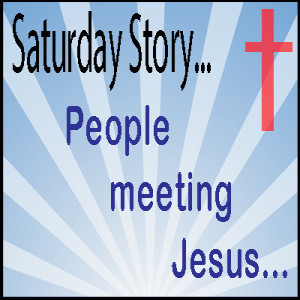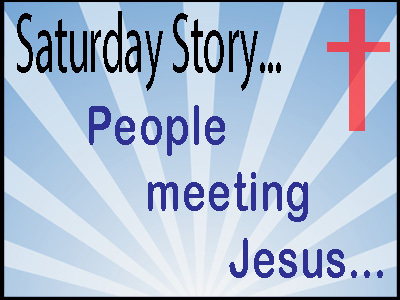
G’day and welcome to Partakers Christian Podcasts! Join us for uplifting Bible teaching, inspiring readings, heartfelt worship, powerful prayers, and fascinating church history. Whether you’re new to faith or growing deeper in your journey, we’re here to encourage and equip you. 🎧 Tune in, interact, and be inspired—wherever you are in the world.
Episodes

Saturday Jun 08, 2024
Partakers Bible Thought – The Spirit Explodes 17
Saturday Jun 08, 2024
Saturday Jun 08, 2024

The Spirit Explodes
Part 17 of 22
The magnificent couple
Acts 18:1–28
by Roger Kirby
I am going to cheat a little in this study! All our recent ones have been determined by geography – following Paul’s travels. If we do that here we shall have a very short study on Corinth followed next time by a very long one on Ephesus, so I am going to focus on Aquila and Priscilla, the most significant couple in the early church. Our study will cover them in both Corinth and Ephesus and glide over the fact that in between those two cities Paul finished his second journey, spent time at Antioch, and then started his third journey.
Corinth was an unpromising place. It was more important than Athens in all except cultural matters. It was a seaport on the narrow isthmus of land between southern and northern Greece (as we call it now). It was a vigorous commercial centre notorious for loose living. Yet it proved to be more receptive to the Gospel than many other quieter cities.
Read Acts 18:1–4.
These verses introduce us to Aquila and Priscilla. Presumably they had been converted in Rome. It has been suggested that not all the Jews in Rome can have been thrown out – since there were about 40000 of them, that would have been difficult. So perhaps they had been treated as troublemakers because of their belief in Jesus.
This passage tells us more about what Paul did than we have been told previously. All Jewish men, however study minded, were expected to learn a trade. Paul was a worker in canvas and leather, probably cutting and stitching at a bench or sitting cross-legged with them in a small open fronted shop in the street of the tent-makers. The three of them, working together, would have had many opportunities to chat with the passers by and tell them about Jesus.
Question 1: What are the advantages and disadvantages in working while also being a pastor or evangelist?
Read Acts 18:5 – 11
Question 2: What about where you are? Does the Lord have many people in your city, as yet unrecognized as Christians as is implied in Corinth? Have you any assurance about that?
Read Acts 18:12 – 23.
Question 3: What would you infer from that?
Read Acts 18:24 – 28.
Question 4: How can we avoid that sort of human weakness?
Question 5: if that is so, what is it implied that he did not have, that was much more important than a mere matter of baptism?
Right Mouse click to download episode 17 as an audio mp3 file

Friday Jun 07, 2024
Partakers Bible Thought – The Spirit Explodes 16
Friday Jun 07, 2024
Friday Jun 07, 2024

The Spirit Explodes
Part 16 of 22
Many challenges!
Acts 17:1 – 34
by Roger Kirby
There are many intriguing things happening in this part of the journey as the apostolic band travels south towards the great cities of Athens and Corinth. It sounds as though they did not stop for more than a night until they reached Thessalonica, the capital of the Roman province of Macedonia. Unlike Philippi it was a free city in the Emperor’s favour because it had been on the right side in the civil war three generations earlier.
Read Acts 17:1 – 9.
Question 1: - Probably few or none of us are good at all these things, but we will all be better at some than others. Which are you good at?
Question 2: - The proving bit reads ‘proving that the Messiah had to suffer and rise from the dead”. How would Paul have proved that? How can we do something equivalent?
Read Acts 17:10 – 15.
Question 3: - Of the people you know who are not yet Christians who would be the most likely to ‘examine the scriptures’ diligently?
Read Acts 17:16 – 34.
Question 4: - What makes you think more deeply about the sad and bad things in the world around you? If you don’t, what should do so?
Question 5: - Depending on where you are coming from, what your surrounding culture is, you may be surrounded by images, or completely free of them. Is your situation right? Would you be able to worship the true and only God better if all or most of the images you see were removed or could you do with some (perhaps a cross) to help you worship?
Question 6: - What is he assuming here?
Question 7: - The resurrection seemed as unlikely then as it does now. How do you argue for its reality?
Right Mouse click to download episode 16 as an audio mp3 file

Thursday Jun 06, 2024
Partakers Bible Thought – The Spirit Explodes 15
Thursday Jun 06, 2024
Thursday Jun 06, 2024

The Spirit Explodes
Part 15 of 22
Excitements at Philippi!
Acts 15:36–16:40.
by Roger Kirby
We do not know why John Mark had left the little group of missionaries to return to Jerusalem. Of course it turned out that the most important thing he would ever do, writing his Gospel, was still some distance in the future. It is also clear that Paul forgave him enough to have him working with him and then to be anxious to be visited by him when in prison.
~
Question 1: What about a bit of guesswork? What reasons might Mark have had for going back to Jerusalem that he thought were good reasons and Paul did not?
Read Acts 16:1 – 5.
Question 2: Why did Paul circumcise Timothy just after it had been agreed that non-Jewish Christians did not need to be circumcised?~
Read Acts 16:6 – 12.
Question 3: Would you agree that this is a good way of proceeding?
Read Acts 16:13 – 15.
Question 4: What does the fact that she was baptized mean?
Read Acts 16:16 – 40.
Question 5: What is the sequence of actions that lead to the joy of the jailer?
Question 6: Why did Paul and Silas not say they were Roman citizens before they were beaten and avoid a very painful experience?
Right Mouse click or tap here to download episode 15 as an audio mp3 file

Wednesday Jun 05, 2024
Partakers Bible Thought – The Spirit Explodes 14
Wednesday Jun 05, 2024
Wednesday Jun 05, 2024

The Spirit Explodes
Part 14 of 22
Who are the people of God?
Acts 15:1–35.
by Roger Kirby
Who are the people of God? That is and was indeed the question. About 4 studies ago we heard about the problems that arose over the question of what the people of God could eat. As a result of a vision, Peter understood that there were no foods that the people of God could not eat. That was the second of the 3 requirements; circumcision, food laws and Sabbath keeping, that had come to dominate the concerns of the serious Jews who thought of themselves as the only true people of God. Now we come to the first of these and the most important – circumcision.
This was a very critical question. Reluctance to be circumcised as adults would affect the willingness of non-Jewish men to become full converts and follow Jesus completely. It affected the role of women, who, not being subject to circumcision, would forever be second-class citizens in a kingdom for which that was the badge of entrance. Since not being circumcised would mean that followers of Jesus would no longer belong to Judaism they would not enjoy the freedom from harassment and persecution because they did not worship the Roman gods, that the Jews had enjoyed since the days of Julius Caesar.
Much was at stake, as some former Pharisees, now seeking to follow Jesus, correctly realised. They wanted Jesus’ followers to constitute a sub-group of Judaism. We read Acts 15:1–11.
There was therefore a profound theological disagreement between the Pharisaic believers and what was happening far away from Jerusalem. The fundamental underlying question was ‘how do we know who are the people of God in this new situation?’ or ‘what are the marks of a Christian?’. Before we go any further you need to think very carefully what the answer to the following question is in your place and culture. We have already come across this question and its Biblical answer. But what is the practical identifier where you are?
Question 1: What are the marks of a Christian?
We read Acts 15:12–21.
Question 2: Why did James quote from scripture?
Question 3: How would this relate to what Paul says in Romans 15: We who are strong ought to bear with the failings of the weak and not to please ourselves. Each of us should please our neighbours for their good, to build them up? How does it relate to us?
Question 4: What idol do we have the most difficulty in avoiding?
We read Acts 15: 22 – 35.
Question 5: The letter said ‘it seemed good to the Holy Spirit and to us’. How did they know the mind of the Spirit? How do we know the leading of the same Spirit when we are so liable to add in our own desires to what we think he wants?
Right Mouse click or tap here to download episode 14 as an audio mp3 file

Tuesday Jun 04, 2024
Partakers Bible Thought – The Spirit Explodes 13
Tuesday Jun 04, 2024
Tuesday Jun 04, 2024

The Spirit Explodes
Part 13 of 22
Mixed receptions
(Acts 13:42–14:28)
by Roger Kirby
What happened next in Pisidian Antioch proved to be a foretaste of what would happen in city after city. With a few variations this was:they arrived, they spoke to the Jews, usually in the synagogue, a few days later those who had heard what they had said before arrived and contradicted them, stirring up a riot and having them thrown out of the synagogue and often the city. All that took a varying length of time, not noted, but probably a few weeks. They then continued on their travels, returning later, when things had quietened down to make sure the believers were meeting in a regular and controlled fashion. It would be a mistake to think they spent just a couple of weeks here and a couple there after the fashion of modern evangelists. Life went much more slowly in those days and they clearly spent long enough, or as long as they could, in each city to establish a viable church.
Read Acts 13:42 – 52.
Question 1: Imagine that you were one of the crowd who heard Paul when he preached for the first time. What would he have said that particularly attracted you? What would he have said that you were not so sure about? Would you have been for him, or against him?
Question 2:Are you the sort of person who likes to be first to have some new thing that has just come onto the market – like the latest iPad or Android Tablet? People who rush to buy such things are called the innovators. Or, are you the sort of person who waits cautiously to see if they really work the way the advertisements say before you buy – just before the next new marvel comes on the market.
Question 3: Are you so stuck in your ways that you cannot react as you know you really ought to do to the challenge that the Lord has laid before you through the work of the Holy Spirit?
Read Acts 14:1 – 28
Question 4: What is the chief difference you noticed as we read it?
Right Mouse click or tap here to download episode 13 as an audio mp3 file

Monday Jun 03, 2024
Partakers Bible Thought – The Spirit Explodes 12
Monday Jun 03, 2024
Monday Jun 03, 2024

The Spirit Explodes
Part 12 of 22
Opening the door to the Gentiles
(Acts 12:26–13:41)
by Roger Kirby
As we noted in the last study, in the sometimes surprising purposes of God, the gospel was to go to all nations, as promised to Abraham long ago. It is now clear that Antioch was to be the centre of this great movement.
Acts 12:25–Acts 13:3.
The 5 named leaders in the church in Antioch were a Jew from a priestly family in Cyprus, a black African, a North African Arab (probably), a boyhood friend of Herod, and a Hellenistic Jew.
Question 1: What does that tell us about the early church? How does your church compare with this?
Acts 13:4–12
Question 2: What reasons can there possibly be for this? Where should we expect most conflict to come from and where will it not come from?
Acts 13:13–16
Question 3: How do we expect a preacher to establish contact with his audience?
Acts 13:17–25
Question 4: In which direction? What would he have said to “spin” it in the other direction? What would have been the result? Why does he mention John the Baptist?
Acts 13:26
Question 5: What would your likely reaction to this statement be?
Acts 13:27–37
Question 6: What was Paul’s main argument in these verses? Where did he get confirmation of his arguments?
Question 7: What are our main arguments in defence of our faith? Where can we get confirmation from?
Acts 13:38–41
Question 8: What did Paul want his hearers to do?
Right Mouse click to download episode 12 as an audio mp3 file

Sunday Jun 02, 2024
Partakers Bible Thought – The Spirit Explodes 11
Sunday Jun 02, 2024
Sunday Jun 02, 2024

The Spirit Explodes
Part 11 of 22
The expansion of the Church
(Acts 11:1–12:25)
by Roger Kirby
These two chapters record the events that led to the transfer of the significant heart of the early church from Jerusalem to Antioch. Antioch was the third largest city of the Roman world, strategically placed near the north-east corner of the Mediterranean sea.
First we read the third account (Luke’s technique for emphasis again) of how Peter came to recognize Cornelius and his friends to be true Christians. In the first verse Luke signals that another milestone has been reached: the Gentiles received the word of God. The rest of this passage adds nothing significant to what we have already heard.
Note how, curiously, Luke never mentions the name of Cornelius in this passage. To ask ‘why’ would make a good question but I don’t know what the answer is so I won't!
Let's continue to explore together! Listen to the mp3 and answer the questions of this study!
Question 1: What does Peter say is the mark of the Christian? How does he identify the true followers of Jesus?
Question 2: What does this chapter tell us about where the ultimate power lies?
Question 3: Peter walked through many gates on his way out of prison but was left standing at the door of a Christian house. Is this anything more than an incidental detail? If so, what?
Question 4: Why do you think Luke put it in here?
Right Mouse click to download episode 11 as an audio mp3 file

Saturday Jun 01, 2024
Saturday Testimony Story - Naz
Saturday Jun 01, 2024
Saturday Jun 01, 2024
Saturday Story
People meeting Jesus
The story of Naz...
Today we are hearing the story of Naz from Bangladesh... Come and listen to his story of faith... It is in the languages of English and Bangla... It was recorded in a busy Somerset cafe, so there is some minimal background noise...
You can now purchase our Partakers books! Please do click or tap here to visit our Amazon site!
Click or tap on the appropriate link below to subscribe, share or download our iPhone App! ![]()
![]()
![]()
![]()
![]()
![]()
![]()
![]()

Saturday Jun 01, 2024
Partakers Bible Thought – The Spirit Explodes 10
Saturday Jun 01, 2024
Saturday Jun 01, 2024

The Spirit Explodes
Part 10 of 22
A major step : welcoming non-Jews
(Acts 9:32–10:48)
After introducing Paul to us, Luke switches back to 3 stories about Peter, 2 minor and one major. First the 2 minor stories. As we read them watch out for several sharply contrasting features between the first and the second.
Read Acts 9:32–43.
Question 1: Apart from the obvious one of a bed-ridden person and a dead person, what are the major contrasts between these 2 stories? What are we meant to learn from them?
Read Acts 10:1–18.
Question 2: What would these verses have meant to Theophilus, the guy for whom Luke wrote this book?
Read Acts 10:9–16.
Question 3: What would his reaction have been?
Question 4: What is the general significance of him being told this?
Read Acts 10:17–43.
Question 5: What were the most important things in his talk? What would have been the bullet points if he had had a computer?
Read Acts 10:44–48.
Question 6: This is a fundamentally important question. What was to replace the rules of Judaism?
Right Mouse click or tap here to download episode 10 as an audio mp3 file

Friday May 31, 2024
Partakers Bible Thought – The Spirit Explodes 09
Friday May 31, 2024
Friday May 31, 2024

The Spirit Explodes
Part 9 of 22 - The Conversion of Paul
(Acts 9:1-31)
by Roger Kirby
This story is usually called ‘the conversion of Paul’ but, as we shall see, it was a very unusual conversion. The word ‘conversion’ means a complete change of mind and actions. Paul (we will call him that although for the next four and a half chapters, until a name change is noted, he is actually called Saul) made a complete change in his actions but not in his mind. He considered his decision to follow Jesus a natural, if forced, development from his Jewish belief in God.
Question 1: Paul changed his mind about Jesus. But what exactly was it about Jesus that forced him to change his mind?
Question 2.: Which Old Testament image or images will Paul have instantly related the lights and the voice to?
Question 3: Which was it for Paul?
Question 4: Which was it for you?
Question 5: Are you confident the Lord has seized hold of you?
Question 6: What one word best describes what he did?
Question 7: Paul hit the church like a whirlwind. Apart from his natural ability and energy levels, which were clearly very high, what was it about him that enabled him to make such an impact?
Question 8: What does that imply for us?

